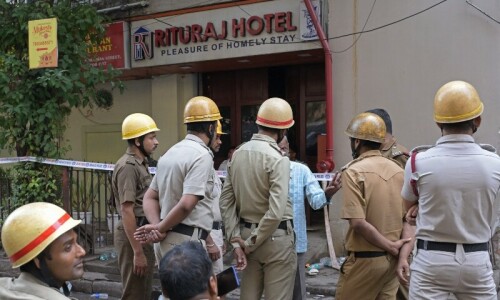ISLAMABAD: The Supreme Judicial Council (SJC) is meeting here on Dec 31 to take up a complaint of misconduct against a judge of the Lahore High Court.
The council is the only constitutional forum invoked under Article 209 of the Constitution for removing superior court judges.
An informed source privy to the development told Dawn that the SJC, headed by Chief Justice of Pakistan Mian Saqib Nisar, might resume the reference against Justice Muhammad Farrukh Irfan Khan of the LHC on Dec 31.
Justice Irfan is facing a reference on misconduct after his name surfaced in the list of those having properties abroad, but he was issued a show-cause notice by the SJC in February last year. The judge is also seeking a public trial of the reference pending adjudication against him before the SJC.
The judge was also one of the movers of a petition before a five-judge Supreme Court bench which had on May 10 empowered the SJC to decide afresh by revisiting a May 18, 2017, order of holding an in-camera hearing against two sitting judges facing allegations of misconduct namely Justice Shaukat Aziz Siddiqui and Justice Irfan.
Recently, the chief justice, in one of the proceedings, observed that he would like to clear the backlog of references before the SJC. Consequently, on Oct 12, the charges against former chief justice of Islamabad High Court Muhammad Anwar Khan Kasi were dropped on misconduct, though it recommended removal of former Justice Shaukat Aziz Siddiqui from the same high court by invoking Article 209 of the Constitution for displaying a conduct unbecoming of a judge by delivering a speech.
Shaukat Siddiqui has since been removed as judge of the high court.
Earlier, Justice Mazhar Iqbal Sidhu also of the LHC had resigned on Feb 28 last year, two days before the SJC hearing against him. Likewise, allegations against Justice Mazahir Ali Naqvi of the LHC were also dropped by the SJC.
The May 10 apex court verdict, however, had explained that SJC could always direct in-camera proceedings if there was a reasonable apprehension that the judge whose capacity or conduct was being inquired into or his lawyers were likely to indulge in scurrilous and scandalous allegations against the SJC or its members, especially with the intention of publicising the same to hamper the proceedings of the council.
The verdict had also explained that the in-camera proceedings in fact were intended to ensure protection of the rights and reputation of the person whose conduct and capacity was being inquired into and the protection of the institution of the judiciary, including members of the SJC.
Referring to the objection raised by Justice Irfan in his petition challenging the authority of the SJC of devising its own rules, the Supreme Court had held that SJC Procedure of Enquiry, 2005 reflected the implied authority of the council to do all acts and employ all means necessary to exercise the jurisdiction conferred and to fulfil its mandate in accordance with the Constitution and hence were legally valid and effective in law.
In response, Justice Irfan filed a review petition before the Supreme Court by challenging only that part of the judgement that allows the SJC to make its own rule.
In his review petition, Justice Irfan through his lawyer Hamid Khan contended before the apex court that the May 10 judgement had undermined the basic structure and the scheme of the Constitution and, therefore, was against the well-established principles of interpreting the Constitution and thus violative of the express dictates of the Constitution.
The judgement has failed to appreciate that if a rule making power did not require an express provisions of law and all institutions were vested with such implied power to make rules, then what was the wisdom of the framers of the Constitution in providing express provisions of rule-making authority throughout the scheme of the Constitution in Articles 67, 72, 88, 99, 139, 191, 202, 203 J, 221 and even for the superior courts under Articles 191, 221 and 202.
Thus by adopting the interpretation that rule making power can be implied or is otherwise an ancillary or incidental power, the judgement is attributing redundancy to different provisions of the constitution and to laws promulgated under the law, the review petition argued.
If the jurisdiction to make rules under Article 209 is considered to be vested under the doctrine of implied power, then by that logic there is no need to specifically confer jurisdiction under Article 210 of the Constitution on SJC to enforce attendance of persons etc. This power can also be said to have been implied with the council without an express provision, the petition contended, adding that the judgement had thus erred in declaring that SJC was the sole authority which shall determine the procedure under Article 209 and in this manner has made redundant the role of the president under Article 209 of the Constitution.
It is expected that when the reference will be taken up by the SJC on Dec 31, the senior counsel representing Justice Irfan may invite the attention of the council to the pending review petition before the Supreme Court and seek postponement of the same.
Published in Dawn, December 27th, 2018
















































